Report on Entrepreneurship and Small Business Management in UK
VerifiedAdded on 2020/10/22
|14
|4015
|129
Report
AI Summary
This report provides a comprehensive overview of entrepreneurship and small business management, focusing on various types of entrepreneurial ventures, including social, small, large, and scalable start-ups, and their characteristics. It analyzes the similarities and differences between these ventures, highlighting the importance of small and start-up businesses in contributing to social and economic growth, particularly in the UK. The report also specifies the impact of micro and small businesses on the economy, discussing statistical data and the influence of factors such as Brexit. Furthermore, it explores the characteristics, traits, and skills of successful entrepreneurs, along with the aspects reflecting entrepreneurial motivation and mindset, and the background factors that can either foster or hinder entrepreneurship. The report concludes by summarizing key findings and providing relevant references.

Entrepreneurship and Small
Business Management
Business Management
Paraphrase This Document
Need a fresh take? Get an instant paraphrase of this document with our AI Paraphraser
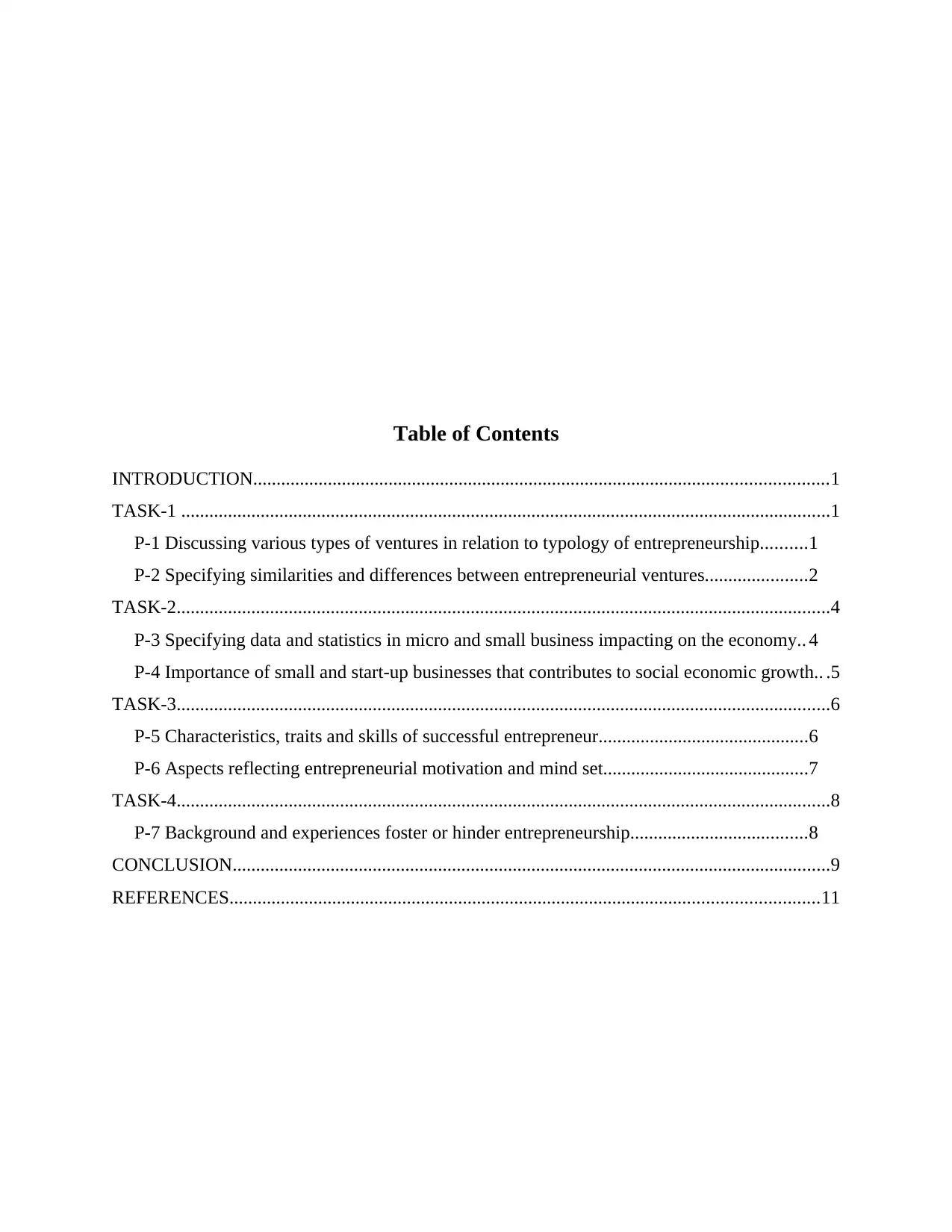
Table of Contents
INTRODUCTION...........................................................................................................................1
TASK-1 ...........................................................................................................................................1
P-1 Discussing various types of ventures in relation to typology of entrepreneurship..........1
P-2 Specifying similarities and differences between entrepreneurial ventures......................2
TASK-2............................................................................................................................................4
P-3 Specifying data and statistics in micro and small business impacting on the economy.. 4
P-4 Importance of small and start-up businesses that contributes to social economic growth.. .5
TASK-3............................................................................................................................................6
P-5 Characteristics, traits and skills of successful entrepreneur.............................................6
P-6 Aspects reflecting entrepreneurial motivation and mind set............................................7
TASK-4............................................................................................................................................8
P-7 Background and experiences foster or hinder entrepreneurship......................................8
CONCLUSION................................................................................................................................9
REFERENCES..............................................................................................................................11
INTRODUCTION...........................................................................................................................1
TASK-1 ...........................................................................................................................................1
P-1 Discussing various types of ventures in relation to typology of entrepreneurship..........1
P-2 Specifying similarities and differences between entrepreneurial ventures......................2
TASK-2............................................................................................................................................4
P-3 Specifying data and statistics in micro and small business impacting on the economy.. 4
P-4 Importance of small and start-up businesses that contributes to social economic growth.. .5
TASK-3............................................................................................................................................6
P-5 Characteristics, traits and skills of successful entrepreneur.............................................6
P-6 Aspects reflecting entrepreneurial motivation and mind set............................................7
TASK-4............................................................................................................................................8
P-7 Background and experiences foster or hinder entrepreneurship......................................8
CONCLUSION................................................................................................................................9
REFERENCES..............................................................................................................................11
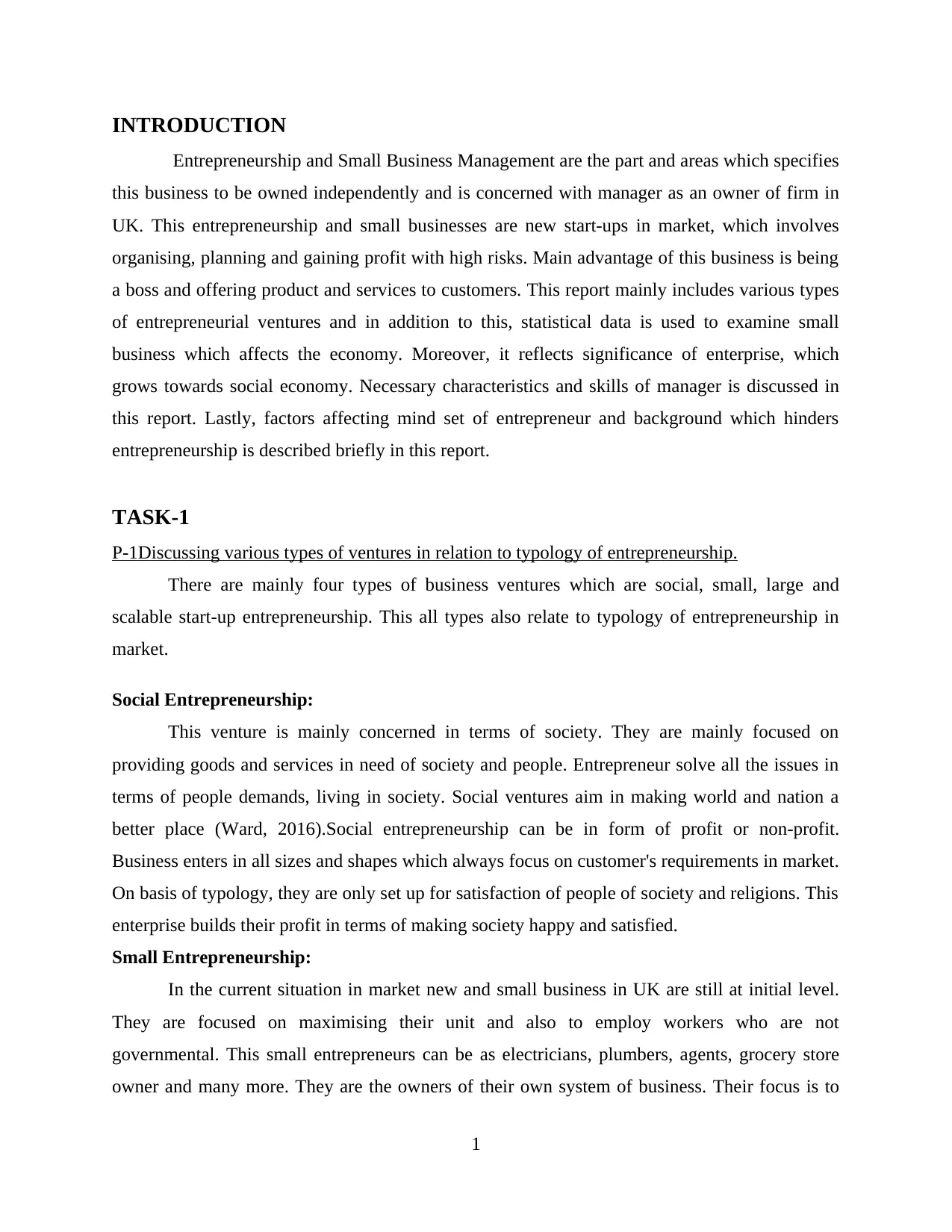
INTRODUCTION
Entrepreneurship and Small Business Management are the part and areas which specifies
this business to be owned independently and is concerned with manager as an owner of firm in
UK. This entrepreneurship and small businesses are new start-ups in market, which involves
organising, planning and gaining profit with high risks. Main advantage of this business is being
a boss and offering product and services to customers. This report mainly includes various types
of entrepreneurial ventures and in addition to this, statistical data is used to examine small
business which affects the economy. Moreover, it reflects significance of enterprise, which
grows towards social economy. Necessary characteristics and skills of manager is discussed in
this report. Lastly, factors affecting mind set of entrepreneur and background which hinders
entrepreneurship is described briefly in this report.
TASK-1
P-1Discussing various types of ventures in relation to typology of entrepreneurship.
There are mainly four types of business ventures which are social, small, large and
scalable start-up entrepreneurship. This all types also relate to typology of entrepreneurship in
market.
Social Entrepreneurship:
This venture is mainly concerned in terms of society. They are mainly focused on
providing goods and services in need of society and people. Entrepreneur solve all the issues in
terms of people demands, living in society. Social ventures aim in making world and nation a
better place (Ward, 2016).Social entrepreneurship can be in form of profit or non-profit.
Business enters in all sizes and shapes which always focus on customer's requirements in market.
On basis of typology, they are only set up for satisfaction of people of society and religions. This
enterprise builds their profit in terms of making society happy and satisfied.
Small Entrepreneurship:
In the current situation in market new and small business in UK are still at initial level.
They are focused on maximising their unit and also to employ workers who are not
governmental. This small entrepreneurs can be as electricians, plumbers, agents, grocery store
owner and many more. They are the owners of their own system of business. Their focus is to
1
Entrepreneurship and Small Business Management are the part and areas which specifies
this business to be owned independently and is concerned with manager as an owner of firm in
UK. This entrepreneurship and small businesses are new start-ups in market, which involves
organising, planning and gaining profit with high risks. Main advantage of this business is being
a boss and offering product and services to customers. This report mainly includes various types
of entrepreneurial ventures and in addition to this, statistical data is used to examine small
business which affects the economy. Moreover, it reflects significance of enterprise, which
grows towards social economy. Necessary characteristics and skills of manager is discussed in
this report. Lastly, factors affecting mind set of entrepreneur and background which hinders
entrepreneurship is described briefly in this report.
TASK-1
P-1Discussing various types of ventures in relation to typology of entrepreneurship.
There are mainly four types of business ventures which are social, small, large and
scalable start-up entrepreneurship. This all types also relate to typology of entrepreneurship in
market.
Social Entrepreneurship:
This venture is mainly concerned in terms of society. They are mainly focused on
providing goods and services in need of society and people. Entrepreneur solve all the issues in
terms of people demands, living in society. Social ventures aim in making world and nation a
better place (Ward, 2016).Social entrepreneurship can be in form of profit or non-profit.
Business enters in all sizes and shapes which always focus on customer's requirements in market.
On basis of typology, they are only set up for satisfaction of people of society and religions. This
enterprise builds their profit in terms of making society happy and satisfied.
Small Entrepreneurship:
In the current situation in market new and small business in UK are still at initial level.
They are focused on maximising their unit and also to employ workers who are not
governmental. This small entrepreneurs can be as electricians, plumbers, agents, grocery store
owner and many more. They are the owners of their own system of business. Their focus is to
1
⊘ This is a preview!⊘
Do you want full access?
Subscribe today to unlock all pages.

Trusted by 1+ million students worldwide
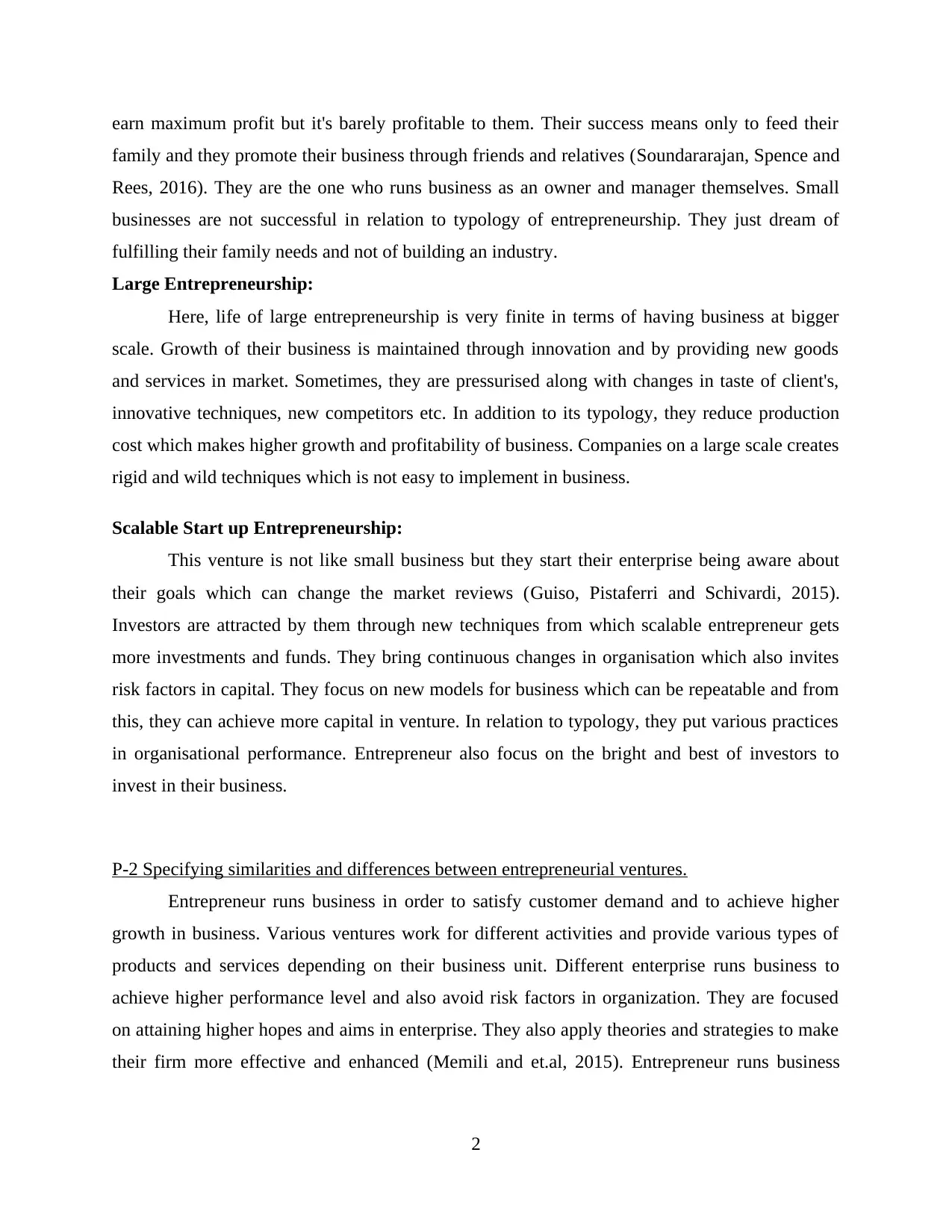
earn maximum profit but it's barely profitable to them. Their success means only to feed their
family and they promote their business through friends and relatives (Soundararajan, Spence and
Rees, 2016). They are the one who runs business as an owner and manager themselves. Small
businesses are not successful in relation to typology of entrepreneurship. They just dream of
fulfilling their family needs and not of building an industry.
Large Entrepreneurship:
Here, life of large entrepreneurship is very finite in terms of having business at bigger
scale. Growth of their business is maintained through innovation and by providing new goods
and services in market. Sometimes, they are pressurised along with changes in taste of client's,
innovative techniques, new competitors etc. In addition to its typology, they reduce production
cost which makes higher growth and profitability of business. Companies on a large scale creates
rigid and wild techniques which is not easy to implement in business.
Scalable Start up Entrepreneurship:
This venture is not like small business but they start their enterprise being aware about
their goals which can change the market reviews (Guiso, Pistaferri and Schivardi, 2015).
Investors are attracted by them through new techniques from which scalable entrepreneur gets
more investments and funds. They bring continuous changes in organisation which also invites
risk factors in capital. They focus on new models for business which can be repeatable and from
this, they can achieve more capital in venture. In relation to typology, they put various practices
in organisational performance. Entrepreneur also focus on the bright and best of investors to
invest in their business.
P-2 Specifying similarities and differences between entrepreneurial ventures.
Entrepreneur runs business in order to satisfy customer demand and to achieve higher
growth in business. Various ventures work for different activities and provide various types of
products and services depending on their business unit. Different enterprise runs business to
achieve higher performance level and also avoid risk factors in organization. They are focused
on attaining higher hopes and aims in enterprise. They also apply theories and strategies to make
their firm more effective and enhanced (Memili and et.al, 2015). Entrepreneur runs business
2
family and they promote their business through friends and relatives (Soundararajan, Spence and
Rees, 2016). They are the one who runs business as an owner and manager themselves. Small
businesses are not successful in relation to typology of entrepreneurship. They just dream of
fulfilling their family needs and not of building an industry.
Large Entrepreneurship:
Here, life of large entrepreneurship is very finite in terms of having business at bigger
scale. Growth of their business is maintained through innovation and by providing new goods
and services in market. Sometimes, they are pressurised along with changes in taste of client's,
innovative techniques, new competitors etc. In addition to its typology, they reduce production
cost which makes higher growth and profitability of business. Companies on a large scale creates
rigid and wild techniques which is not easy to implement in business.
Scalable Start up Entrepreneurship:
This venture is not like small business but they start their enterprise being aware about
their goals which can change the market reviews (Guiso, Pistaferri and Schivardi, 2015).
Investors are attracted by them through new techniques from which scalable entrepreneur gets
more investments and funds. They bring continuous changes in organisation which also invites
risk factors in capital. They focus on new models for business which can be repeatable and from
this, they can achieve more capital in venture. In relation to typology, they put various practices
in organisational performance. Entrepreneur also focus on the bright and best of investors to
invest in their business.
P-2 Specifying similarities and differences between entrepreneurial ventures.
Entrepreneur runs business in order to satisfy customer demand and to achieve higher
growth in business. Various ventures work for different activities and provide various types of
products and services depending on their business unit. Different enterprise runs business to
achieve higher performance level and also avoid risk factors in organization. They are focused
on attaining higher hopes and aims in enterprise. They also apply theories and strategies to make
their firm more effective and enhanced (Memili and et.al, 2015). Entrepreneur runs business
2
Paraphrase This Document
Need a fresh take? Get an instant paraphrase of this document with our AI Paraphraser
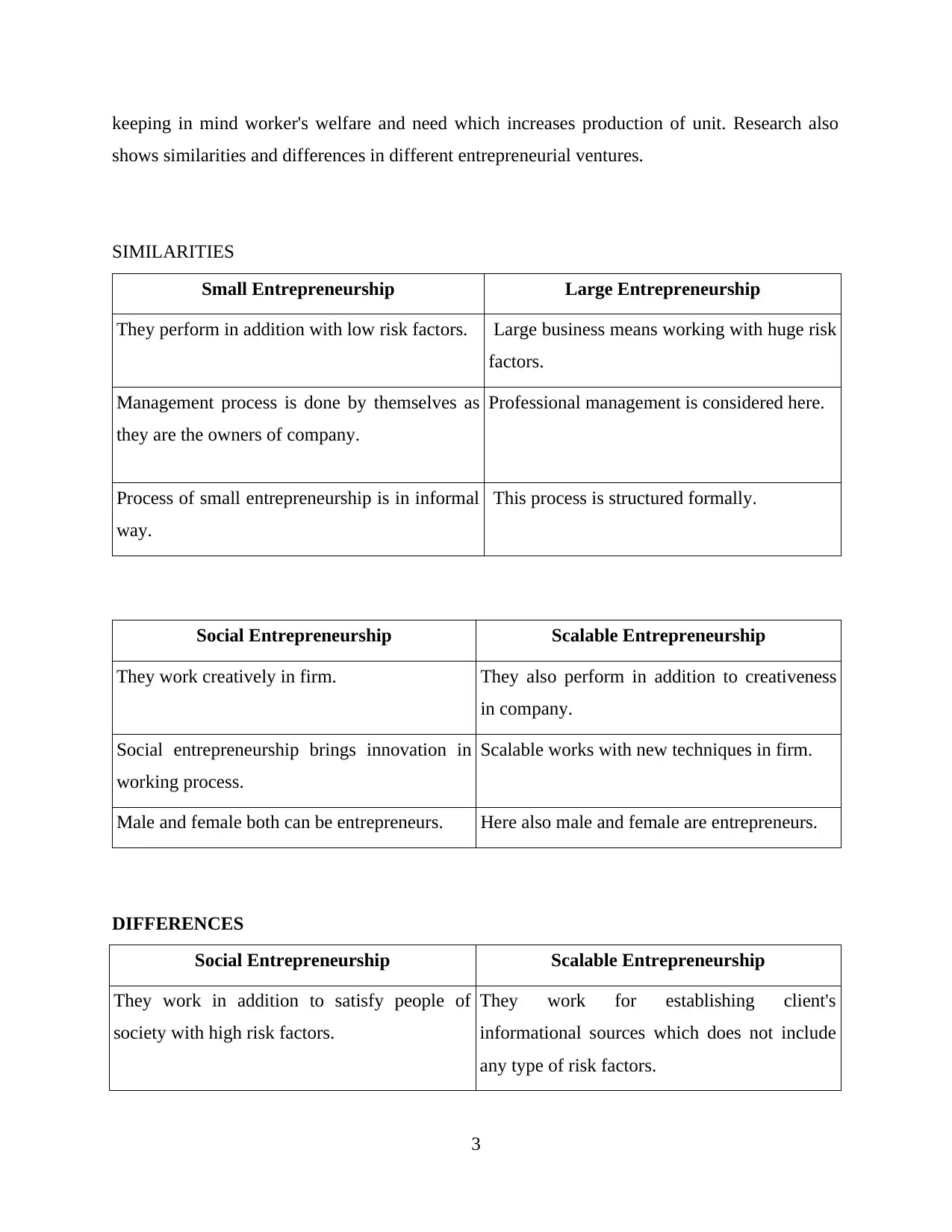
keeping in mind worker's welfare and need which increases production of unit. Research also
shows similarities and differences in different entrepreneurial ventures.
SIMILARITIES
Small Entrepreneurship Large Entrepreneurship
They perform in addition with low risk factors. Large business means working with huge risk
factors.
Management process is done by themselves as
they are the owners of company.
Professional management is considered here.
Process of small entrepreneurship is in informal
way.
This process is structured formally.
Social Entrepreneurship Scalable Entrepreneurship
They work creatively in firm. They also perform in addition to creativeness
in company.
Social entrepreneurship brings innovation in
working process.
Scalable works with new techniques in firm.
Male and female both can be entrepreneurs. Here also male and female are entrepreneurs.
DIFFERENCES
Social Entrepreneurship Scalable Entrepreneurship
They work in addition to satisfy people of
society with high risk factors.
They work for establishing client's
informational sources which does not include
any type of risk factors.
3
shows similarities and differences in different entrepreneurial ventures.
SIMILARITIES
Small Entrepreneurship Large Entrepreneurship
They perform in addition with low risk factors. Large business means working with huge risk
factors.
Management process is done by themselves as
they are the owners of company.
Professional management is considered here.
Process of small entrepreneurship is in informal
way.
This process is structured formally.
Social Entrepreneurship Scalable Entrepreneurship
They work creatively in firm. They also perform in addition to creativeness
in company.
Social entrepreneurship brings innovation in
working process.
Scalable works with new techniques in firm.
Male and female both can be entrepreneurs. Here also male and female are entrepreneurs.
DIFFERENCES
Social Entrepreneurship Scalable Entrepreneurship
They work in addition to satisfy people of
society with high risk factors.
They work for establishing client's
informational sources which does not include
any type of risk factors.
3
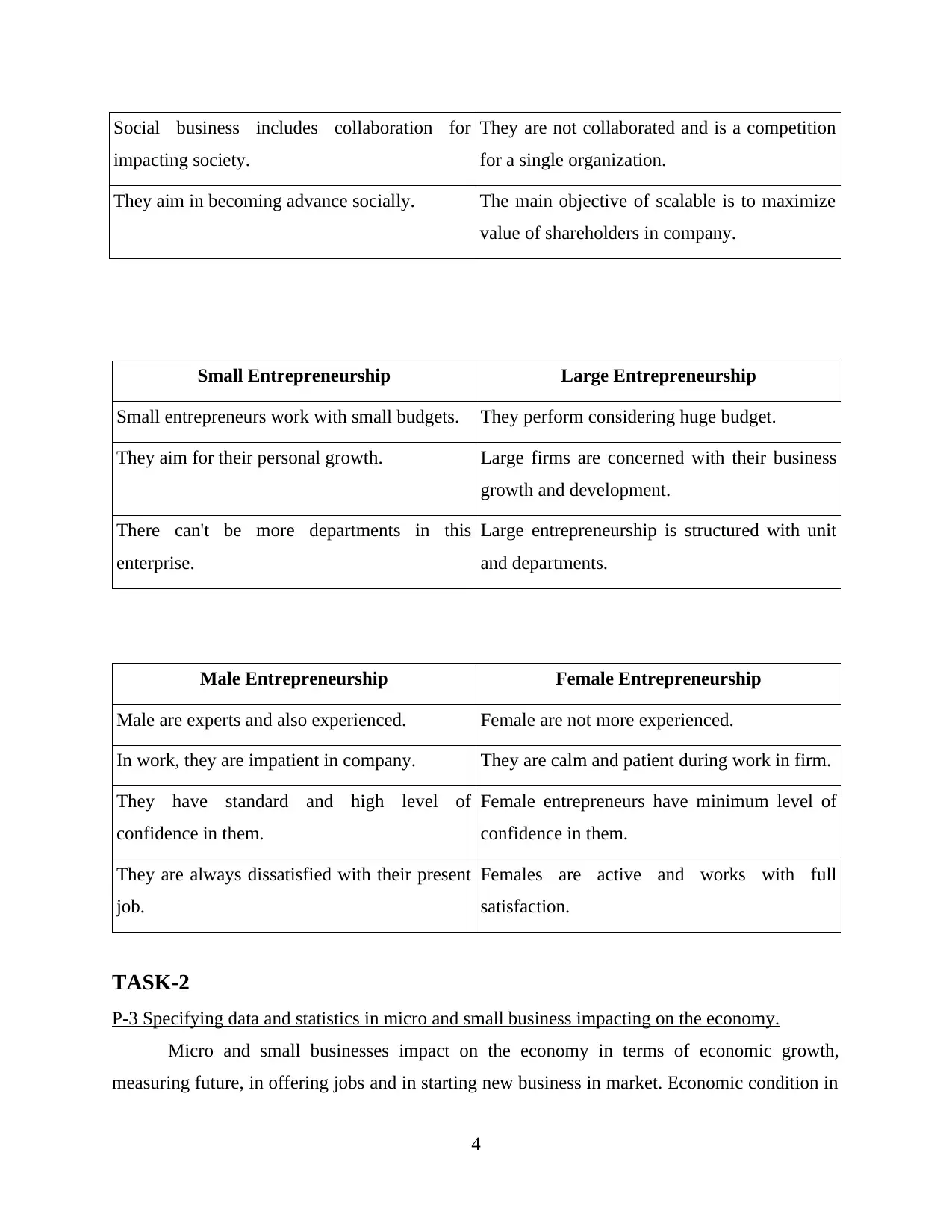
Social business includes collaboration for
impacting society.
They are not collaborated and is a competition
for a single organization.
They aim in becoming advance socially. The main objective of scalable is to maximize
value of shareholders in company.
Small Entrepreneurship Large Entrepreneurship
Small entrepreneurs work with small budgets. They perform considering huge budget.
They aim for their personal growth. Large firms are concerned with their business
growth and development.
There can't be more departments in this
enterprise.
Large entrepreneurship is structured with unit
and departments.
Male Entrepreneurship Female Entrepreneurship
Male are experts and also experienced. Female are not more experienced.
In work, they are impatient in company. They are calm and patient during work in firm.
They have standard and high level of
confidence in them.
Female entrepreneurs have minimum level of
confidence in them.
They are always dissatisfied with their present
job.
Females are active and works with full
satisfaction.
TASK-2
P-3 Specifying data and statistics in micro and small business impacting on the economy.
Micro and small businesses impact on the economy in terms of economic growth,
measuring future, in offering jobs and in starting new business in market. Economic condition in
4
impacting society.
They are not collaborated and is a competition
for a single organization.
They aim in becoming advance socially. The main objective of scalable is to maximize
value of shareholders in company.
Small Entrepreneurship Large Entrepreneurship
Small entrepreneurs work with small budgets. They perform considering huge budget.
They aim for their personal growth. Large firms are concerned with their business
growth and development.
There can't be more departments in this
enterprise.
Large entrepreneurship is structured with unit
and departments.
Male Entrepreneurship Female Entrepreneurship
Male are experts and also experienced. Female are not more experienced.
In work, they are impatient in company. They are calm and patient during work in firm.
They have standard and high level of
confidence in them.
Female entrepreneurs have minimum level of
confidence in them.
They are always dissatisfied with their present
job.
Females are active and works with full
satisfaction.
TASK-2
P-3 Specifying data and statistics in micro and small business impacting on the economy.
Micro and small businesses impact on the economy in terms of economic growth,
measuring future, in offering jobs and in starting new business in market. Economic condition in
4
⊘ This is a preview!⊘
Do you want full access?
Subscribe today to unlock all pages.

Trusted by 1+ million students worldwide
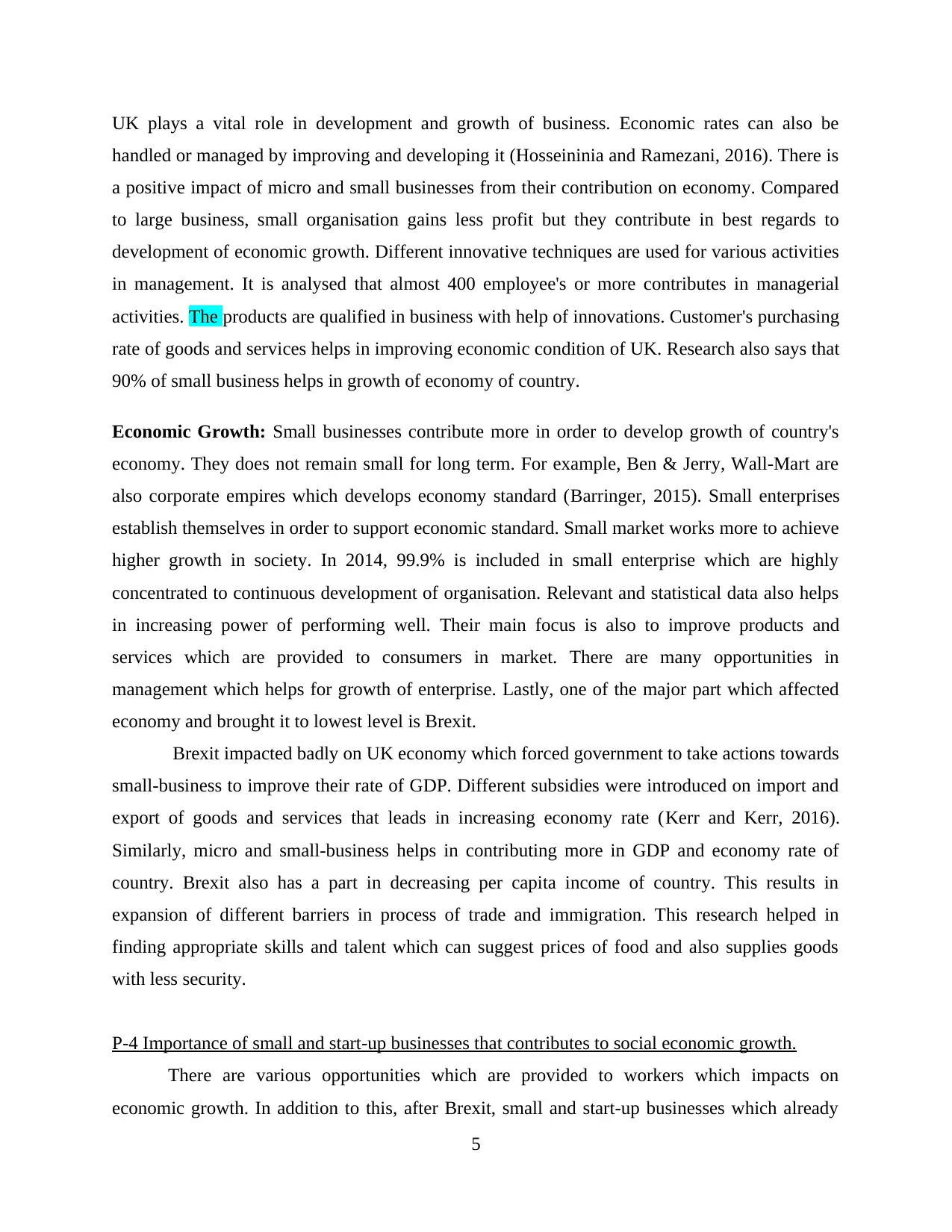
UK plays a vital role in development and growth of business. Economic rates can also be
handled or managed by improving and developing it (Hosseininia and Ramezani, 2016). There is
a positive impact of micro and small businesses from their contribution on economy. Compared
to large business, small organisation gains less profit but they contribute in best regards to
development of economic growth. Different innovative techniques are used for various activities
in management. It is analysed that almost 400 employee's or more contributes in managerial
activities. The products are qualified in business with help of innovations. Customer's purchasing
rate of goods and services helps in improving economic condition of UK. Research also says that
90% of small business helps in growth of economy of country.
Economic Growth: Small businesses contribute more in order to develop growth of country's
economy. They does not remain small for long term. For example, Ben & Jerry, Wall-Mart are
also corporate empires which develops economy standard (Barringer, 2015). Small enterprises
establish themselves in order to support economic standard. Small market works more to achieve
higher growth in society. In 2014, 99.9% is included in small enterprise which are highly
concentrated to continuous development of organisation. Relevant and statistical data also helps
in increasing power of performing well. Their main focus is also to improve products and
services which are provided to consumers in market. There are many opportunities in
management which helps for growth of enterprise. Lastly, one of the major part which affected
economy and brought it to lowest level is Brexit.
Brexit impacted badly on UK economy which forced government to take actions towards
small-business to improve their rate of GDP. Different subsidies were introduced on import and
export of goods and services that leads in increasing economy rate (Kerr and Kerr, 2016).
Similarly, micro and small-business helps in contributing more in GDP and economy rate of
country. Brexit also has a part in decreasing per capita income of country. This results in
expansion of different barriers in process of trade and immigration. This research helped in
finding appropriate skills and talent which can suggest prices of food and also supplies goods
with less security.
P-4 Importance of small and start-up businesses that contributes to social economic growth.
There are various opportunities which are provided to workers which impacts on
economic growth. In addition to this, after Brexit, small and start-up businesses which already
5
handled or managed by improving and developing it (Hosseininia and Ramezani, 2016). There is
a positive impact of micro and small businesses from their contribution on economy. Compared
to large business, small organisation gains less profit but they contribute in best regards to
development of economic growth. Different innovative techniques are used for various activities
in management. It is analysed that almost 400 employee's or more contributes in managerial
activities. The products are qualified in business with help of innovations. Customer's purchasing
rate of goods and services helps in improving economic condition of UK. Research also says that
90% of small business helps in growth of economy of country.
Economic Growth: Small businesses contribute more in order to develop growth of country's
economy. They does not remain small for long term. For example, Ben & Jerry, Wall-Mart are
also corporate empires which develops economy standard (Barringer, 2015). Small enterprises
establish themselves in order to support economic standard. Small market works more to achieve
higher growth in society. In 2014, 99.9% is included in small enterprise which are highly
concentrated to continuous development of organisation. Relevant and statistical data also helps
in increasing power of performing well. Their main focus is also to improve products and
services which are provided to consumers in market. There are many opportunities in
management which helps for growth of enterprise. Lastly, one of the major part which affected
economy and brought it to lowest level is Brexit.
Brexit impacted badly on UK economy which forced government to take actions towards
small-business to improve their rate of GDP. Different subsidies were introduced on import and
export of goods and services that leads in increasing economy rate (Kerr and Kerr, 2016).
Similarly, micro and small-business helps in contributing more in GDP and economy rate of
country. Brexit also has a part in decreasing per capita income of country. This results in
expansion of different barriers in process of trade and immigration. This research helped in
finding appropriate skills and talent which can suggest prices of food and also supplies goods
with less security.
P-4 Importance of small and start-up businesses that contributes to social economic growth.
There are various opportunities which are provided to workers which impacts on
economic growth. In addition to this, after Brexit, small and start-up businesses which already
5
Paraphrase This Document
Need a fresh take? Get an instant paraphrase of this document with our AI Paraphraser
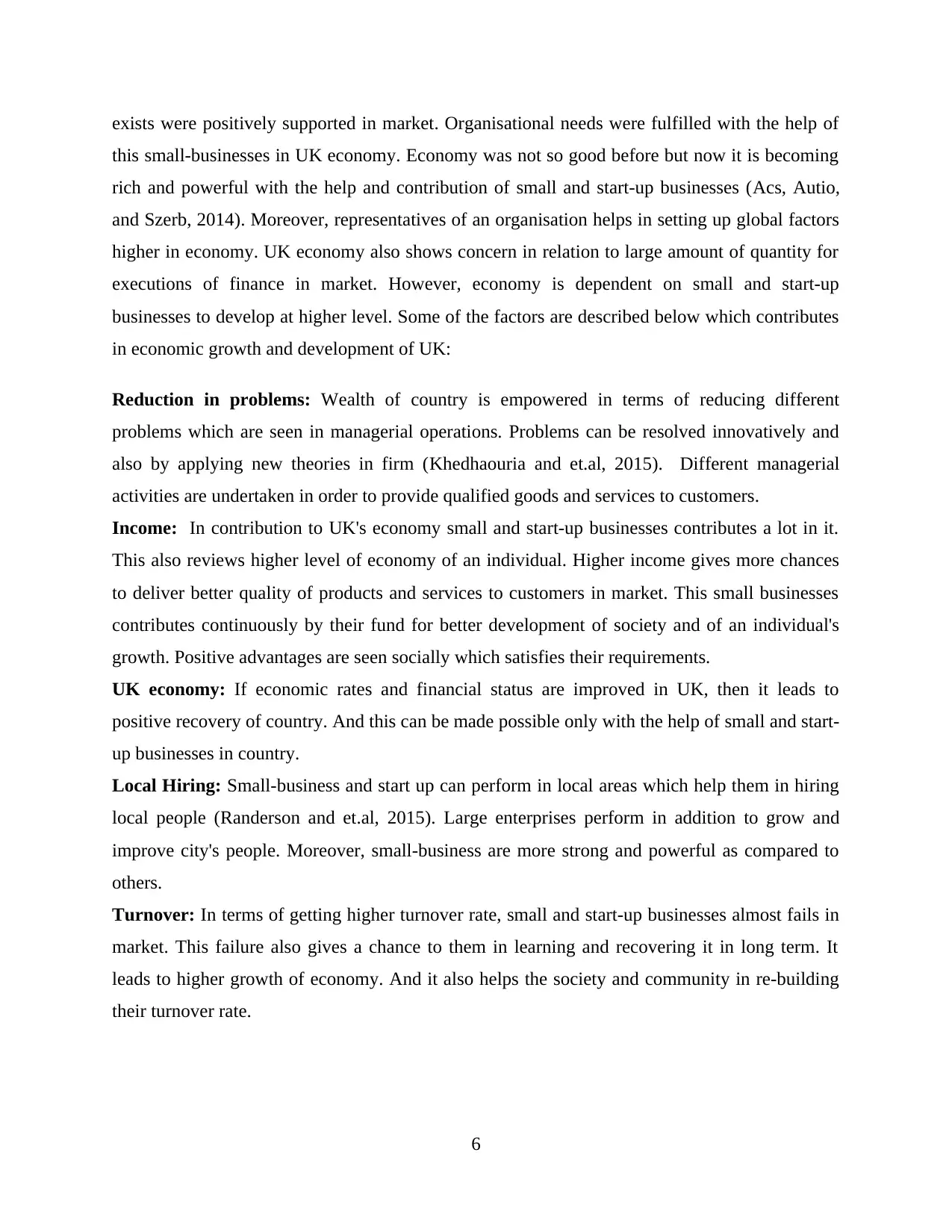
exists were positively supported in market. Organisational needs were fulfilled with the help of
this small-businesses in UK economy. Economy was not so good before but now it is becoming
rich and powerful with the help and contribution of small and start-up businesses (Acs, Autio,
and Szerb, 2014). Moreover, representatives of an organisation helps in setting up global factors
higher in economy. UK economy also shows concern in relation to large amount of quantity for
executions of finance in market. However, economy is dependent on small and start-up
businesses to develop at higher level. Some of the factors are described below which contributes
in economic growth and development of UK:
Reduction in problems: Wealth of country is empowered in terms of reducing different
problems which are seen in managerial operations. Problems can be resolved innovatively and
also by applying new theories in firm (Khedhaouria and et.al, 2015). Different managerial
activities are undertaken in order to provide qualified goods and services to customers.
Income: In contribution to UK's economy small and start-up businesses contributes a lot in it.
This also reviews higher level of economy of an individual. Higher income gives more chances
to deliver better quality of products and services to customers in market. This small businesses
contributes continuously by their fund for better development of society and of an individual's
growth. Positive advantages are seen socially which satisfies their requirements.
UK economy: If economic rates and financial status are improved in UK, then it leads to
positive recovery of country. And this can be made possible only with the help of small and start-
up businesses in country.
Local Hiring: Small-business and start up can perform in local areas which help them in hiring
local people (Randerson and et.al, 2015). Large enterprises perform in addition to grow and
improve city's people. Moreover, small-business are more strong and powerful as compared to
others.
Turnover: In terms of getting higher turnover rate, small and start-up businesses almost fails in
market. This failure also gives a chance to them in learning and recovering it in long term. It
leads to higher growth of economy. And it also helps the society and community in re-building
their turnover rate.
6
this small-businesses in UK economy. Economy was not so good before but now it is becoming
rich and powerful with the help and contribution of small and start-up businesses (Acs, Autio,
and Szerb, 2014). Moreover, representatives of an organisation helps in setting up global factors
higher in economy. UK economy also shows concern in relation to large amount of quantity for
executions of finance in market. However, economy is dependent on small and start-up
businesses to develop at higher level. Some of the factors are described below which contributes
in economic growth and development of UK:
Reduction in problems: Wealth of country is empowered in terms of reducing different
problems which are seen in managerial operations. Problems can be resolved innovatively and
also by applying new theories in firm (Khedhaouria and et.al, 2015). Different managerial
activities are undertaken in order to provide qualified goods and services to customers.
Income: In contribution to UK's economy small and start-up businesses contributes a lot in it.
This also reviews higher level of economy of an individual. Higher income gives more chances
to deliver better quality of products and services to customers in market. This small businesses
contributes continuously by their fund for better development of society and of an individual's
growth. Positive advantages are seen socially which satisfies their requirements.
UK economy: If economic rates and financial status are improved in UK, then it leads to
positive recovery of country. And this can be made possible only with the help of small and start-
up businesses in country.
Local Hiring: Small-business and start up can perform in local areas which help them in hiring
local people (Randerson and et.al, 2015). Large enterprises perform in addition to grow and
improve city's people. Moreover, small-business are more strong and powerful as compared to
others.
Turnover: In terms of getting higher turnover rate, small and start-up businesses almost fails in
market. This failure also gives a chance to them in learning and recovering it in long term. It
leads to higher growth of economy. And it also helps the society and community in re-building
their turnover rate.
6
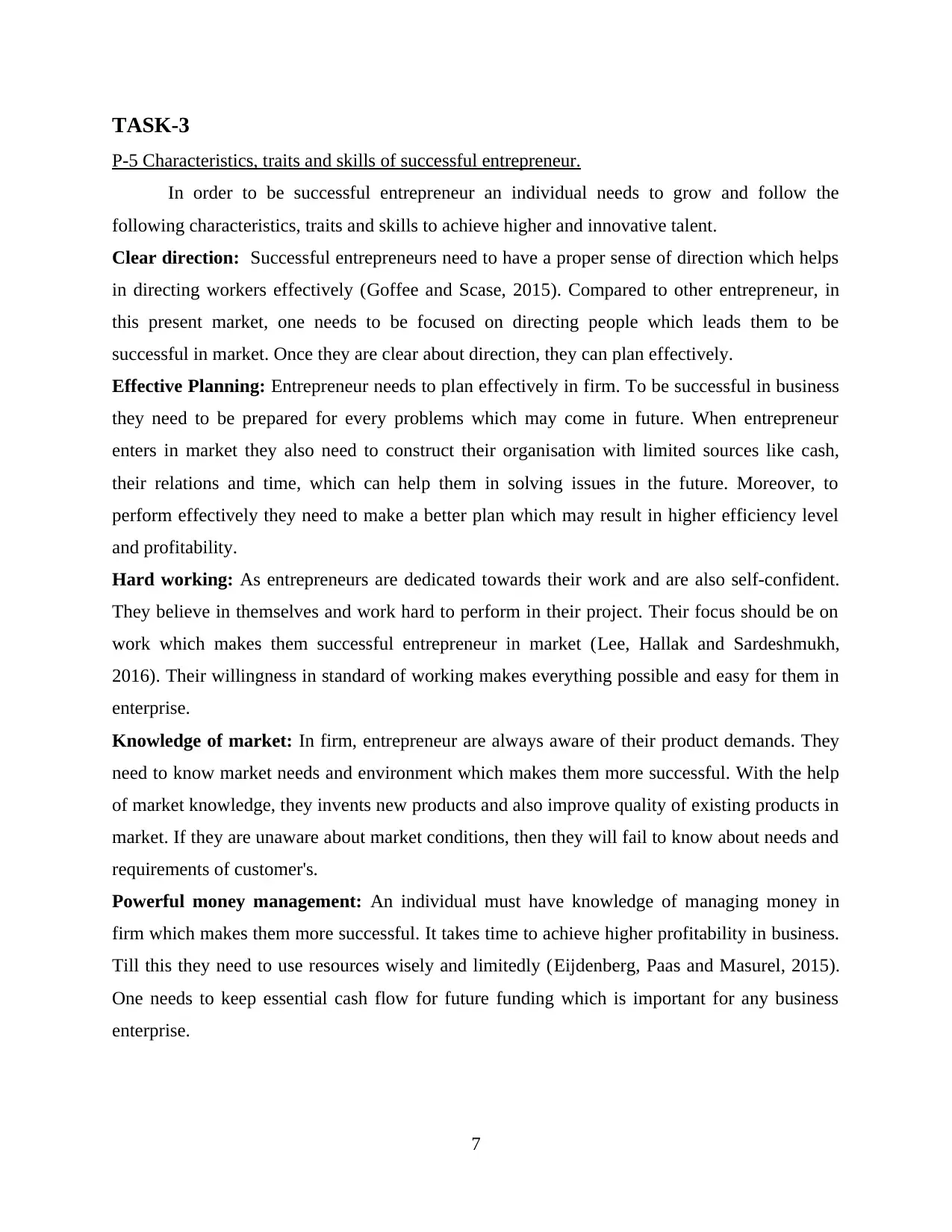
TASK-3
P-5 Characteristics, traits and skills of successful entrepreneur.
In order to be successful entrepreneur an individual needs to grow and follow the
following characteristics, traits and skills to achieve higher and innovative talent.
Clear direction: Successful entrepreneurs need to have a proper sense of direction which helps
in directing workers effectively (Goffee and Scase, 2015). Compared to other entrepreneur, in
this present market, one needs to be focused on directing people which leads them to be
successful in market. Once they are clear about direction, they can plan effectively.
Effective Planning: Entrepreneur needs to plan effectively in firm. To be successful in business
they need to be prepared for every problems which may come in future. When entrepreneur
enters in market they also need to construct their organisation with limited sources like cash,
their relations and time, which can help them in solving issues in the future. Moreover, to
perform effectively they need to make a better plan which may result in higher efficiency level
and profitability.
Hard working: As entrepreneurs are dedicated towards their work and are also self-confident.
They believe in themselves and work hard to perform in their project. Their focus should be on
work which makes them successful entrepreneur in market (Lee, Hallak and Sardeshmukh,
2016). Their willingness in standard of working makes everything possible and easy for them in
enterprise.
Knowledge of market: In firm, entrepreneur are always aware of their product demands. They
need to know market needs and environment which makes them more successful. With the help
of market knowledge, they invents new products and also improve quality of existing products in
market. If they are unaware about market conditions, then they will fail to know about needs and
requirements of customer's.
Powerful money management: An individual must have knowledge of managing money in
firm which makes them more successful. It takes time to achieve higher profitability in business.
Till this they need to use resources wisely and limitedly (Eijdenberg, Paas and Masurel, 2015).
One needs to keep essential cash flow for future funding which is important for any business
enterprise.
7
P-5 Characteristics, traits and skills of successful entrepreneur.
In order to be successful entrepreneur an individual needs to grow and follow the
following characteristics, traits and skills to achieve higher and innovative talent.
Clear direction: Successful entrepreneurs need to have a proper sense of direction which helps
in directing workers effectively (Goffee and Scase, 2015). Compared to other entrepreneur, in
this present market, one needs to be focused on directing people which leads them to be
successful in market. Once they are clear about direction, they can plan effectively.
Effective Planning: Entrepreneur needs to plan effectively in firm. To be successful in business
they need to be prepared for every problems which may come in future. When entrepreneur
enters in market they also need to construct their organisation with limited sources like cash,
their relations and time, which can help them in solving issues in the future. Moreover, to
perform effectively they need to make a better plan which may result in higher efficiency level
and profitability.
Hard working: As entrepreneurs are dedicated towards their work and are also self-confident.
They believe in themselves and work hard to perform in their project. Their focus should be on
work which makes them successful entrepreneur in market (Lee, Hallak and Sardeshmukh,
2016). Their willingness in standard of working makes everything possible and easy for them in
enterprise.
Knowledge of market: In firm, entrepreneur are always aware of their product demands. They
need to know market needs and environment which makes them more successful. With the help
of market knowledge, they invents new products and also improve quality of existing products in
market. If they are unaware about market conditions, then they will fail to know about needs and
requirements of customer's.
Powerful money management: An individual must have knowledge of managing money in
firm which makes them more successful. It takes time to achieve higher profitability in business.
Till this they need to use resources wisely and limitedly (Eijdenberg, Paas and Masurel, 2015).
One needs to keep essential cash flow for future funding which is important for any business
enterprise.
7
⊘ This is a preview!⊘
Do you want full access?
Subscribe today to unlock all pages.

Trusted by 1+ million students worldwide
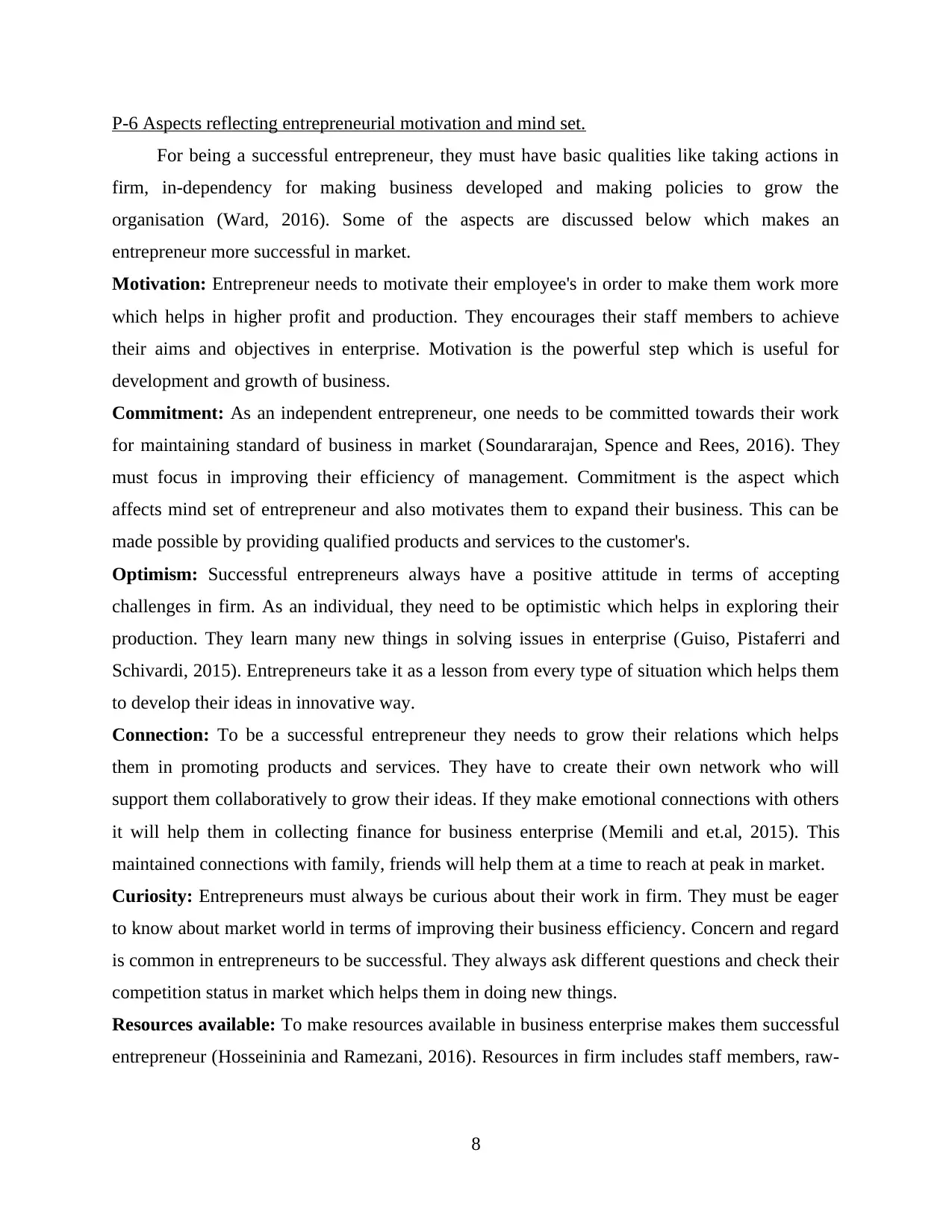
P-6 Aspects reflecting entrepreneurial motivation and mind set.
For being a successful entrepreneur, they must have basic qualities like taking actions in
firm, in-dependency for making business developed and making policies to grow the
organisation (Ward, 2016). Some of the aspects are discussed below which makes an
entrepreneur more successful in market.
Motivation: Entrepreneur needs to motivate their employee's in order to make them work more
which helps in higher profit and production. They encourages their staff members to achieve
their aims and objectives in enterprise. Motivation is the powerful step which is useful for
development and growth of business.
Commitment: As an independent entrepreneur, one needs to be committed towards their work
for maintaining standard of business in market (Soundararajan, Spence and Rees, 2016). They
must focus in improving their efficiency of management. Commitment is the aspect which
affects mind set of entrepreneur and also motivates them to expand their business. This can be
made possible by providing qualified products and services to the customer's.
Optimism: Successful entrepreneurs always have a positive attitude in terms of accepting
challenges in firm. As an individual, they need to be optimistic which helps in exploring their
production. They learn many new things in solving issues in enterprise (Guiso, Pistaferri and
Schivardi, 2015). Entrepreneurs take it as a lesson from every type of situation which helps them
to develop their ideas in innovative way.
Connection: To be a successful entrepreneur they needs to grow their relations which helps
them in promoting products and services. They have to create their own network who will
support them collaboratively to grow their ideas. If they make emotional connections with others
it will help them in collecting finance for business enterprise (Memili and et.al, 2015). This
maintained connections with family, friends will help them at a time to reach at peak in market.
Curiosity: Entrepreneurs must always be curious about their work in firm. They must be eager
to know about market world in terms of improving their business efficiency. Concern and regard
is common in entrepreneurs to be successful. They always ask different questions and check their
competition status in market which helps them in doing new things.
Resources available: To make resources available in business enterprise makes them successful
entrepreneur (Hosseininia and Ramezani, 2016). Resources in firm includes staff members, raw-
8
For being a successful entrepreneur, they must have basic qualities like taking actions in
firm, in-dependency for making business developed and making policies to grow the
organisation (Ward, 2016). Some of the aspects are discussed below which makes an
entrepreneur more successful in market.
Motivation: Entrepreneur needs to motivate their employee's in order to make them work more
which helps in higher profit and production. They encourages their staff members to achieve
their aims and objectives in enterprise. Motivation is the powerful step which is useful for
development and growth of business.
Commitment: As an independent entrepreneur, one needs to be committed towards their work
for maintaining standard of business in market (Soundararajan, Spence and Rees, 2016). They
must focus in improving their efficiency of management. Commitment is the aspect which
affects mind set of entrepreneur and also motivates them to expand their business. This can be
made possible by providing qualified products and services to the customer's.
Optimism: Successful entrepreneurs always have a positive attitude in terms of accepting
challenges in firm. As an individual, they need to be optimistic which helps in exploring their
production. They learn many new things in solving issues in enterprise (Guiso, Pistaferri and
Schivardi, 2015). Entrepreneurs take it as a lesson from every type of situation which helps them
to develop their ideas in innovative way.
Connection: To be a successful entrepreneur they needs to grow their relations which helps
them in promoting products and services. They have to create their own network who will
support them collaboratively to grow their ideas. If they make emotional connections with others
it will help them in collecting finance for business enterprise (Memili and et.al, 2015). This
maintained connections with family, friends will help them at a time to reach at peak in market.
Curiosity: Entrepreneurs must always be curious about their work in firm. They must be eager
to know about market world in terms of improving their business efficiency. Concern and regard
is common in entrepreneurs to be successful. They always ask different questions and check their
competition status in market which helps them in doing new things.
Resources available: To make resources available in business enterprise makes them successful
entrepreneur (Hosseininia and Ramezani, 2016). Resources in firm includes staff members, raw-
8
Paraphrase This Document
Need a fresh take? Get an instant paraphrase of this document with our AI Paraphraser
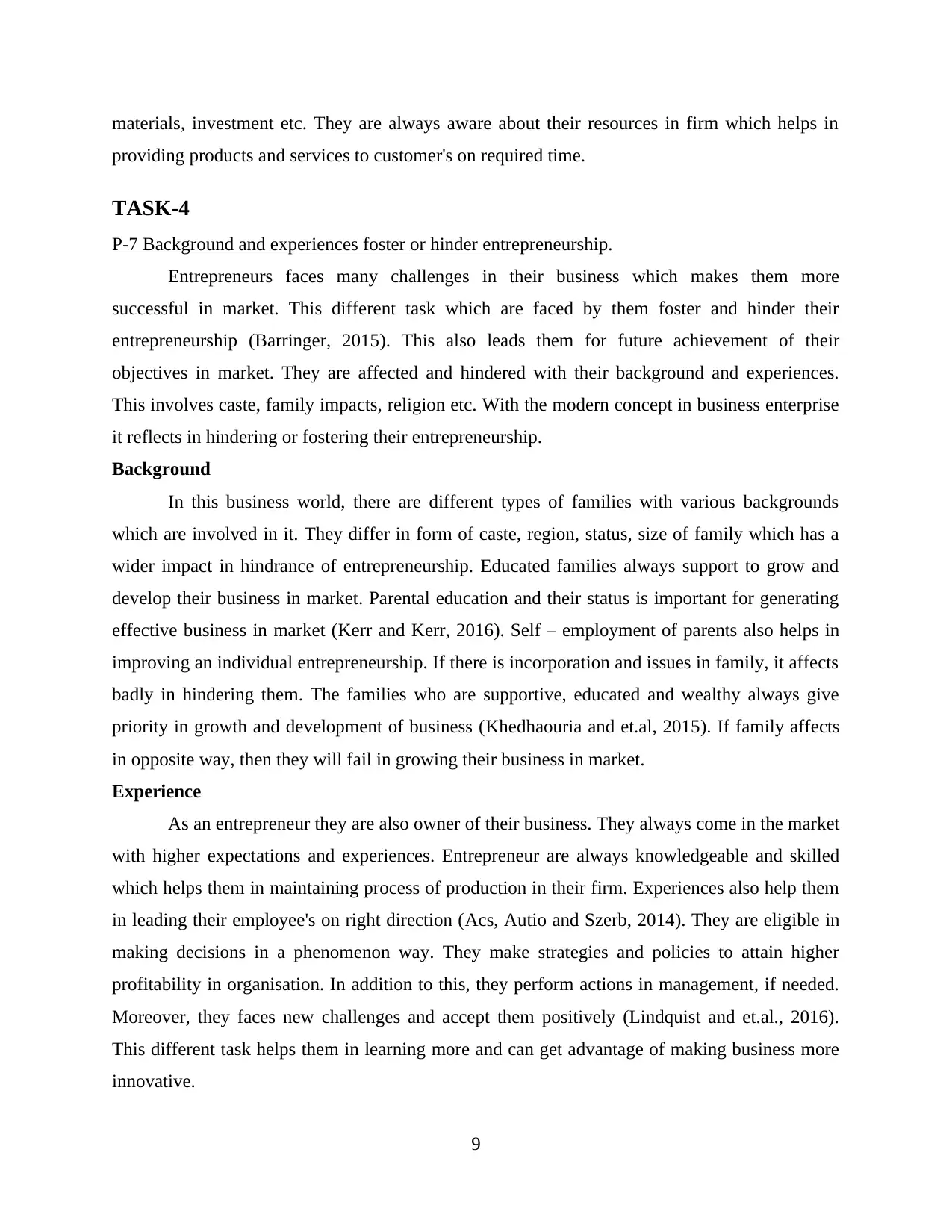
materials, investment etc. They are always aware about their resources in firm which helps in
providing products and services to customer's on required time.
TASK-4
P-7 Background and experiences foster or hinder entrepreneurship.
Entrepreneurs faces many challenges in their business which makes them more
successful in market. This different task which are faced by them foster and hinder their
entrepreneurship (Barringer, 2015). This also leads them for future achievement of their
objectives in market. They are affected and hindered with their background and experiences.
This involves caste, family impacts, religion etc. With the modern concept in business enterprise
it reflects in hindering or fostering their entrepreneurship.
Background
In this business world, there are different types of families with various backgrounds
which are involved in it. They differ in form of caste, region, status, size of family which has a
wider impact in hindrance of entrepreneurship. Educated families always support to grow and
develop their business in market. Parental education and their status is important for generating
effective business in market (Kerr and Kerr, 2016). Self – employment of parents also helps in
improving an individual entrepreneurship. If there is incorporation and issues in family, it affects
badly in hindering them. The families who are supportive, educated and wealthy always give
priority in growth and development of business (Khedhaouria and et.al, 2015). If family affects
in opposite way, then they will fail in growing their business in market.
Experience
As an entrepreneur they are also owner of their business. They always come in the market
with higher expectations and experiences. Entrepreneur are always knowledgeable and skilled
which helps them in maintaining process of production in their firm. Experiences also help them
in leading their employee's on right direction (Acs, Autio and Szerb, 2014). They are eligible in
making decisions in a phenomenon way. They make strategies and policies to attain higher
profitability in organisation. In addition to this, they perform actions in management, if needed.
Moreover, they faces new challenges and accept them positively (Lindquist and et.al., 2016).
This different task helps them in learning more and can get advantage of making business more
innovative.
9
providing products and services to customer's on required time.
TASK-4
P-7 Background and experiences foster or hinder entrepreneurship.
Entrepreneurs faces many challenges in their business which makes them more
successful in market. This different task which are faced by them foster and hinder their
entrepreneurship (Barringer, 2015). This also leads them for future achievement of their
objectives in market. They are affected and hindered with their background and experiences.
This involves caste, family impacts, religion etc. With the modern concept in business enterprise
it reflects in hindering or fostering their entrepreneurship.
Background
In this business world, there are different types of families with various backgrounds
which are involved in it. They differ in form of caste, region, status, size of family which has a
wider impact in hindrance of entrepreneurship. Educated families always support to grow and
develop their business in market. Parental education and their status is important for generating
effective business in market (Kerr and Kerr, 2016). Self – employment of parents also helps in
improving an individual entrepreneurship. If there is incorporation and issues in family, it affects
badly in hindering them. The families who are supportive, educated and wealthy always give
priority in growth and development of business (Khedhaouria and et.al, 2015). If family affects
in opposite way, then they will fail in growing their business in market.
Experience
As an entrepreneur they are also owner of their business. They always come in the market
with higher expectations and experiences. Entrepreneur are always knowledgeable and skilled
which helps them in maintaining process of production in their firm. Experiences also help them
in leading their employee's on right direction (Acs, Autio and Szerb, 2014). They are eligible in
making decisions in a phenomenon way. They make strategies and policies to attain higher
profitability in organisation. In addition to this, they perform actions in management, if needed.
Moreover, they faces new challenges and accept them positively (Lindquist and et.al., 2016).
This different task helps them in learning more and can get advantage of making business more
innovative.
9
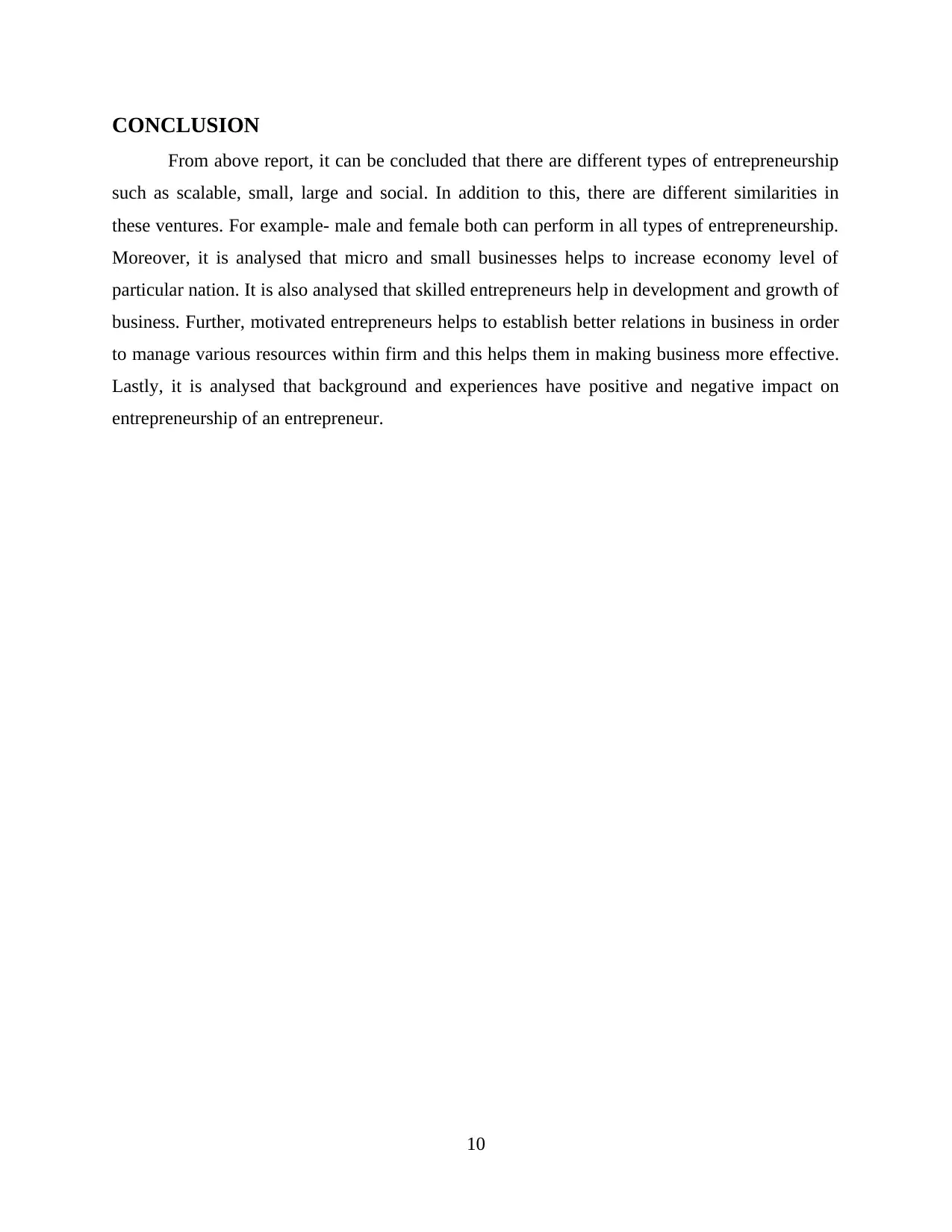
CONCLUSION
From above report, it can be concluded that there are different types of entrepreneurship
such as scalable, small, large and social. In addition to this, there are different similarities in
these ventures. For example- male and female both can perform in all types of entrepreneurship.
Moreover, it is analysed that micro and small businesses helps to increase economy level of
particular nation. It is also analysed that skilled entrepreneurs help in development and growth of
business. Further, motivated entrepreneurs helps to establish better relations in business in order
to manage various resources within firm and this helps them in making business more effective.
Lastly, it is analysed that background and experiences have positive and negative impact on
entrepreneurship of an entrepreneur.
10
From above report, it can be concluded that there are different types of entrepreneurship
such as scalable, small, large and social. In addition to this, there are different similarities in
these ventures. For example- male and female both can perform in all types of entrepreneurship.
Moreover, it is analysed that micro and small businesses helps to increase economy level of
particular nation. It is also analysed that skilled entrepreneurs help in development and growth of
business. Further, motivated entrepreneurs helps to establish better relations in business in order
to manage various resources within firm and this helps them in making business more effective.
Lastly, it is analysed that background and experiences have positive and negative impact on
entrepreneurship of an entrepreneur.
10
⊘ This is a preview!⊘
Do you want full access?
Subscribe today to unlock all pages.

Trusted by 1+ million students worldwide
1 out of 14
Related Documents
Your All-in-One AI-Powered Toolkit for Academic Success.
+13062052269
info@desklib.com
Available 24*7 on WhatsApp / Email
![[object Object]](/_next/static/media/star-bottom.7253800d.svg)
Unlock your academic potential
Copyright © 2020–2026 A2Z Services. All Rights Reserved. Developed and managed by ZUCOL.





